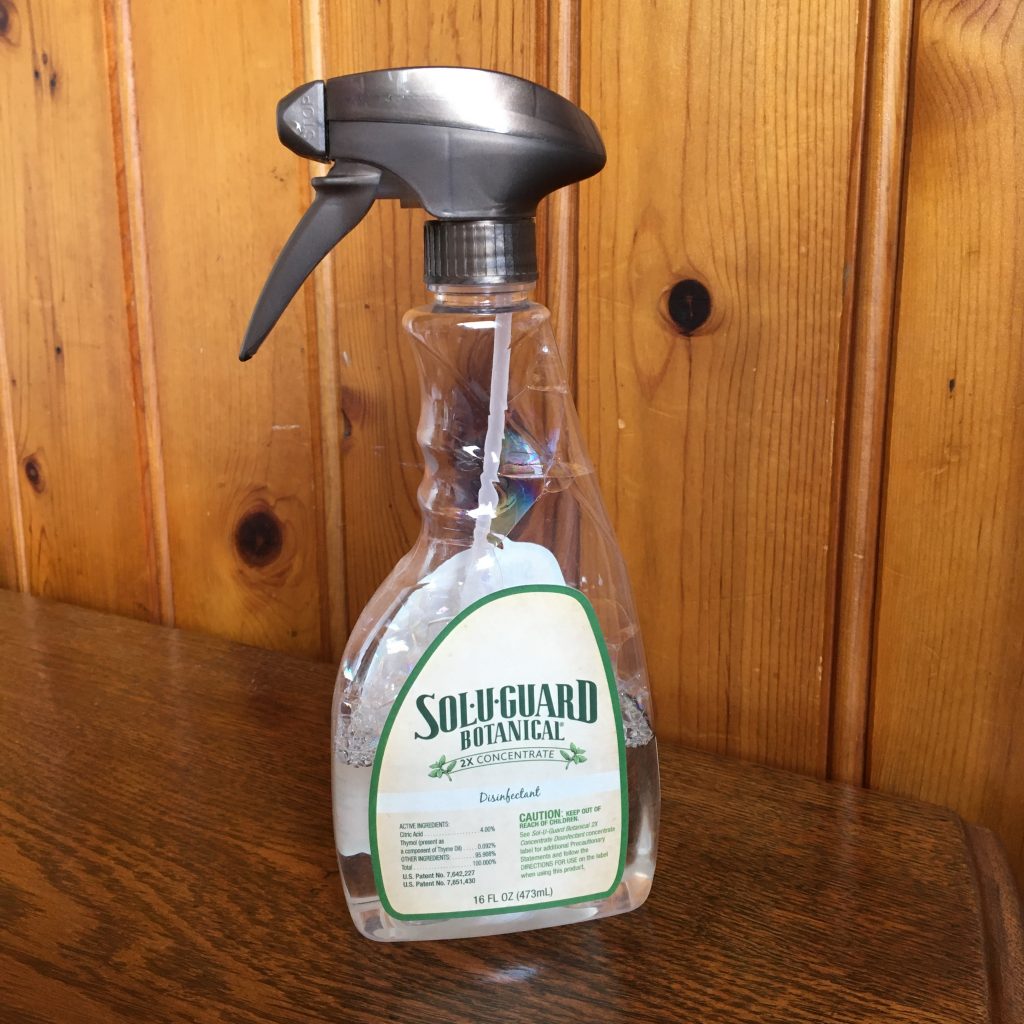Bleach and Lysol have become synonymous with disinfecting surfaces. For many years, I loved the smell of a freshly bleached room or laundry item. I was conditioned to believe that I was doing my best by bleaching things to make them clean and germ-free.
Bleach and disinfectants have a place in our society. Perfect examples of this would be the use of these cleaners in hospitals and public places. Deadly viruses are a serious matter that need fought and controlled. One benefit of using these products is that they are cheap to buy, which in turn helps with overall costs.
However, when it comes to cleaning my home, I rarely use bleach anymore. As for Lysol, I have not owned a quaternary disinfectant (that’s what Lysol is) for over seven years.
Here’s a Few Reasons Why I Don’t Use Bleach and Lysol:
- Bleach and Lysol do serious damage to your lungs and respiratory system. [1][2]
- Bleach is caustic and can cause chemical burns.
- Quaternary disinfectants are linked to COPD, asthma, and respiratory problems. [5] [6]
Bleach, Lysol, Coronavirus, and Lung Health:
The first concern about the use of these cleaning products, is the damage they pose to our respiratory system. According to Medical News Today, respiratory problems are exasperated by the use of common household disinfectants, such as bleach and Lysol. [1]
According to a 20 year study, where twenty-seven separate universities, hospitals, and other researchers contributed, they found that the use of three common household cleaners (bleach, quaternary disinfectants, and ammonia) greatly reduced the lung function of all 6,230 participants. The conclusion of this study was that people who used these cleaners had reduced lung function as though they had smoked a pack of cigarettes a day for 10-20 years! [2]
The World Health Organization cites about one out of six people who contract COVID-19 will “become severely ill and have difficulty breathing.”[3] So, if a person contracts COVID-19, and they are already dealing with breathing issues like COPD, the virus is going to compound these problems.
The evidence is clear that bleach and disinfectants do harm to our respiratory systems. Adding the novel coronavirus to a person struggling with breathing issues sounds like a recipe for disaster.
The bottom line about bleach and quaternary disinfectants is that they damage your ability to breath. So, my question is: why would you use these products that harm your respiratory health, in order to improve your respiratory health? Frankly, it doesn’t make sense.
Are There Safer, Effective Options Available?
The good news is that nature provides safe and effective solutions. And these options are readily available to the consumer.
I love using a disinfectant that is powered by thyme oil and citric acid. I have purchased this particular product from an online wellness company since 2013.
This plant-based disinfectant is proven to kill 99.9% of germs. It has been researched, tested, and registered as safe and effective through the rigorous testing standards of the FDA.[4]
It has a base of thyme oil (thymol) and citric acid. It kills viruses in one minute or less when used on hard, nonporous surfaces: E. coli, staph, salmonella, MRSA, various coronaviruses (influenza strains), poliovirus type 1!
Are Natural Disinfectants Just As Effective As Bleach and Lysol?
According to the FDA, there are many products listed that will kill various pathogens. Thymol and citric acid are among the ingredients listed that are effective against Influenza A (a strain of coronavirus).
The key is to use a disinfectant that is both safe and effective. According to the U.S. National Library of Medicine & National Institutes of Health, a study was published in 2016 about many essential oils and their antimicrobial properties. [7] This study found there are a plethora of essential oils that are effective against various pathogens. Thymol was listed among the tested essential oils.
Effective: Yes!
Safe: Yes!
Smells Good: Yes!
The peace of mind that I have experienced by using natural disinfectants, is knowing that the germs are being killed, but my respiratory health is still optimal. It truly is the best of both worlds!
Please note: At the time of this writing, there has not been time to conduct research to confirm that any disinfectant is 100% effective against the novel coronavirus, COVID-19. [8]
[1] https://www.medicalnewstoday.com/articles/319364
[2] https://www.thoracic.org/about/newsroom/press-releases/resources/women-cleaners-lung-function.pdf
[3] https://www.who.int/news-room/q-a-detail/q-a-coronaviruses#:~:text=symptoms
[4] https://www3.epa.gov/pesticides/chem_search/ppls/066251-00002-20110314.pdf
[5] https://www.sciencedaily.com/releases/2017/09/170910232514.htm
[6] https://www.ncbi.nlm.nih.gov/pmc/articles/PMC5702691/


